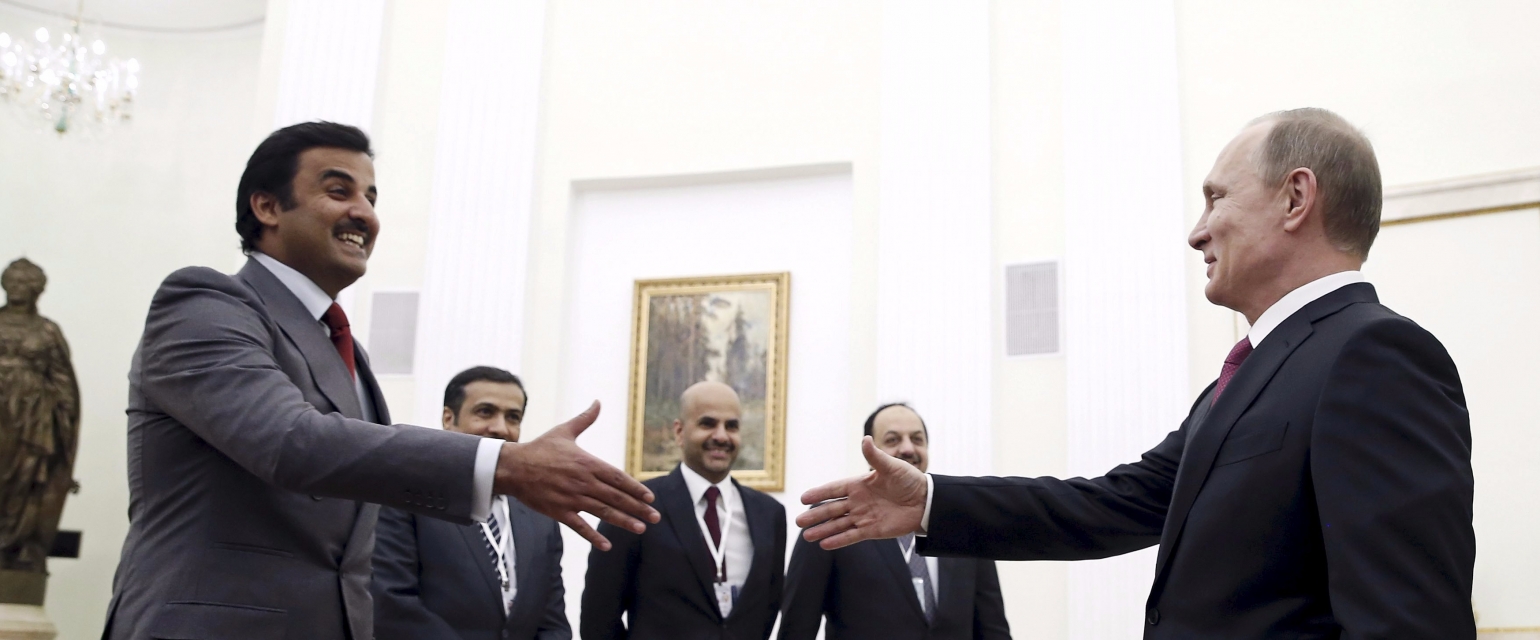

This week the main attention of Russian media was focused on the Davos Economic Forum, where the Russian delegation was surprisingly underrepresented. In its foreign policy, Moscow is increasingly demonstrating a greater willingness to develop the bilateral format of relations with all partners, rather than participating in multilateral political processes.
This focus on bilateral ties has been demonstrated by the recent meeting between the top two Russian and American diplomats – Sergey Lavrov and John Kerry – in Zurich, as well as the visit to Moscow of the Emir of Qatar, Tamim al-Thani.
Instead of going to Davos, Russians decided to work at home
During the business forum “Support of Russia,” Vladimir Putin joked:
“Everyone is here, so I do not know who actually went to Davos.” And then he added: “OK then! Let us get busy working at home!”
The Russian delegation was surprisingly underrepresented at this year’s economic forum in Davos. Deputy Prime Minister Yuri Trutnev, whose tasks in the Russian government are mainly related to the development of Siberia and the Far East, headed the Russian delegation.
Among Russian representatives, the weightiest delegation was that composed of bankers, which included German Gref (Sberbank), Andrey Kostin (VTB), Vladimir Dmitriev (Vnesheconombank). However, at the last moment, the governor of the Central Bank of Russia, Elvira Nabiullina, cancelled her planned visit. This was the case when it really was necessary to work at home.
Much was said at the forum about the need to normalize economic relations between Russia and Europe. In particular, an interesting statement was made by the chairman of the Munich Security Conference, Wolfgang Ischinger:
“I know the position of the German business circles, and these are all in favor of lifting sanctions against Russia today, not a year from now. Germany wants to see Russia as a stable economic partner.”
In general, such statements are not binding on politicians, but recently they have been sounded more often than ever before.
Finland’s Finance Minister, Alexander Stubb, noted that relations between Russia and the West have become much warmer than they were a year ago, and the head of French diplomacy, Laurent Fabius, stressed the need to work together to improve mutual relations. The desire to reduce tensions with Russia was also voiced at the forum by the Prime Minister of Georgia, Giorgi Kvirikashvili.
The one piece of good news from Davos was the latest results of international rankings of competitiveness, in which Russia made it into the Top 50. On the eve of the forum, Bloomberg had published its international innovation rating, in which Russia was listed in 12th place.
The meeting of Lavrov and Kerry in Zurich
The talks between John Kerry and Sergey Lavrov in Zurich became the first meeting between this pair in 2016. The discussion agenda included Syria, Ukraine and the North Korean nuclear program.
Continue reading at Russia Direct
Events that have principle importance to world development are rare in the course of history. The Crimean Spring is undoubtedly one of these. It has triggered a sequence of processes, whose outcome is yet to manifest itself. However, they are already changing the international landscape of the 21st century.
January was marked, above all else, by renewed U.S.-Russian dialogue on a range of international issues, including Syria. For example, conditions were set for inter-Syrian dialogue, although hopes for success there are very small. At the same time, the U.S. side is doing its share to ensure that initiatives for the positive development of U.S.-Russian relations become derailed by making provocative statements, such as the accusations made by U.S. Treasury Department official Adam Szubin about corruption within the Russian government.
Meanwhile, Western politicians have interpreted the authorization vote and the action in Crimea somewhat differently than Russian experts. So far, however, Russian authorities have been unmoved by threats of sanctions and visa bans, possibly because the stakes of backing down on Ukraine at the request of Western governments are higher than staying the course, as long as a full-scale war can be avoided.
The agreements establish a framework for cooperation in the event that either side takes any large-scale military actions, requiring the parties to inform each other in advance of any such steps. The document also sets out a code of conduct to be followed if U.S. or Chinese military air or naval units come into contact with each other.